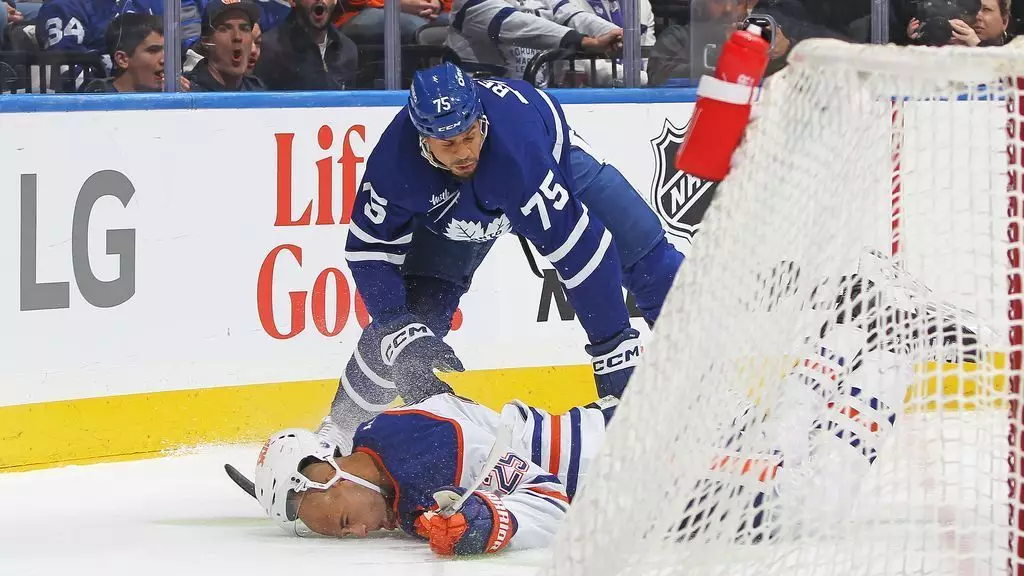In the heart of a fiercely contested game between the Edmonton Oilers and the Toronto Maple Leafs, an incident occurred that highlights the ever-present danger of physical play in hockey. Darnell Nurse, the Oilers’ stalwart defenseman, suffered a nasty hit from Toronto’s forward, Ryan Reaves, early in the second period. As Nurse attempted to navigate around his net, he was unexpectedly struck in the head, leaving him bloodied and incapacitated on the ice. This shocking moment not only led to Nurse being escorted off for treatment but also raised critical questions about player safety and the limits of physicality in the sport.
The immediate aftermath of Nurse’s injury reverberated through the arena, silencing the crowd at the Scotiabank Arena and compelling Oilers’ players to react. Reaves received a match penalty and a game misconduct, escalating the situation beyond the parameters of ordinary gameplay penalties. The seriousness of the hit drew sharp criticism from teammates and fans alike. Oilers’ forward Ryan Nugent-Hopkins articulated the frustrations many felt, emphasizing the recklessness of the play given that Nurse was not in a position to defend himself. Such comments underline that the consequences of dangerous hits extend beyond mere injury; they provoke discussions about player accountability and the responsibilities players have toward each other.
The incident also spotlights Ryan Reaves’ history as a player known for his physical style. Over a 15-year NHL career, Reaves has faced suspensions for similar infractions, raising questions about whether a player with such a track record should be engaged in high-risk plays, particularly in a league increasingly focused on player safety. His actions on the ice may evoke a more significant debate about how the NHL regulates physicality, challenging the traditional notion that aggressive play is just part of the hockey culture.
The Role of Leadership in Addressing Safety Concerns
The conversations triggered by this incident are critical for the NHL moving forward. Leadership from both teams must prioritize player safety while fostering a competitive spirit. Connor McDavid, the Oilers’ captain, engaged in a brief exchange with Reaves after the hit, symbolizing the immediate emotional response from those who genuinely care about their teammates’ well-being. These reactions can serve as a catalyst for a profound cultural shift within the league, prompting players to be more mindful of how their actions on the ice affect their peers.
The injury to Darnell Nurse serves as a poignant reminder of the fine line separating physicality and recklessness in the NHL. This incident has the potential not only to affect the outcome of the season for the Oilers but also to ignite a long-overdue discussion about player safety, accountability, and the steps the league must take to protect its athletes. The NHL finds itself at a crucial juncture where it must reconsider how to regulate physicality without compromising the intensity and passion that define the sport. This incident may unearth needed changes that prioritize player safety while preserving the integrity and excitement of hockey.

